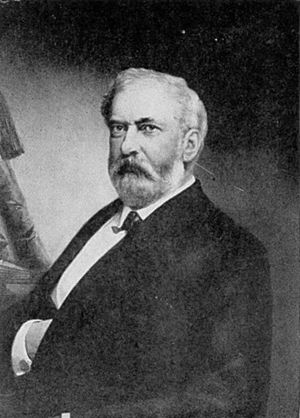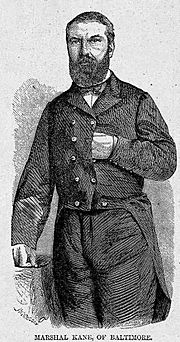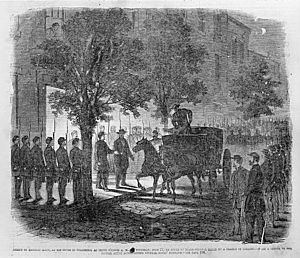George Proctor Kane facts for kids
Quick facts for kids
George P. Kane
|
|
|---|---|
 |
|
| 26th Mayor of Baltimore | |
| In office November 5, 1877 – June 23, 1878 |
|
| Preceded by | Ferdinand C. Latrobe |
| Succeeded by | Ferdinand C. Latrobe |
| Personal details | |
| Born | August 4, 1817 Baltimore, Maryland, US |
| Died | June 23, 1878 (aged 60) Baltimore, Maryland, US |
| Political party | Whig (1841–1854) Democratic (1854–1878) |
| Spouse | Anne C. Griffith (m. 1830s) |
| Profession | US Marshal |
George Proctor Kane (born August 4, 1817 – died June 23, 1878) was an American politician and police officer. He is most famous for being the Marshal of Police during the Baltimore riot of 1861. After the riot, he was arrested and held in places like Fort McHenry without a proper trial. His job as Marshal and his support for the Southern states were reasons why Abraham Lincoln secretly traveled through Baltimore in 1861. Lincoln was on his way to become president and wanted to avoid any possible danger. Even with his political views, Kane helped protect and escort Mary Todd Lincoln, the future First Lady, when she arrived in Baltimore.
Contents
George P. Kane's Life Story
Early Years and Community Work
George P. Kane was born in Baltimore, Maryland, in 1817. His family were immigrants from Ireland. When he was young, he worked in the grain and grocery business. He also joined military groups and became a colonel in the First Maryland Regiment of Artillery.
Kane was very involved in Baltimore's politics. He first supported the old Whig Party and Henry Clay, who ran for president. In 1844, Kane was a leader in a big parade for Clay.
In 1847, during a terrible famine in Ireland, Kane helped organize relief efforts. He was president of the Hibernian Society, a group that supported Irish people. He also helped create Baltimore's first professional, paid fire department system in 1858–1859. Before this, fire fighting was done by volunteers.
Becoming a Police Marshal
In 1849, Kane became the Collector of the Port of Baltimore. This was an important job managing trade.
In the 1850s, Baltimore had many problems with political corruption and gang violence. The city's new police department was formed in 1857 to help fix these issues. The state government wanted to make changes, and they looked for a strong leader for the police. George Kane became the Marshal of Police in 1860. He worked under the new Mayor, George William Brown. Many people believed Kane greatly improved the police force. Mayor Brown later said that the police became very disciplined and effective under Kane's leadership.
The Baltimore Plot and Lincoln's Secret Trip
In February 1861, a detective named Allan Pinkerton discovered what he thought was a plan to harm President-elect Abraham Lincoln. Lincoln was traveling through Baltimore on his way to Washington, D.C., for his inauguration. Pinkerton told Lincoln that Marshal Kane, who had just been appointed, was a "rabid rebel." Pinkerton worried that Kane might not protect Lincoln well, possibly helping the plot. He even claimed to have heard Kane say he wouldn't provide a police escort for Lincoln.
Baltimore was a city with strong support for the Southern states at this time. Unlike other cities, Baltimore had not planned a big welcome for Lincoln. Because of Pinkerton's information, Lincoln decided to change his travel plans. He passed through Baltimore secretly, nine hours earlier than planned.
In 1868, Kane wrote his own story about these events. He said he expected Lincoln to arrive by train at Calvert Street Station. He planned for Lincoln to stop at a mansion on Mt. Vernon Place for a meal, avoiding the main station and crowds. Kane claimed he carried out his plan, but Lincoln was not on the train. Lincoln had already traveled through Baltimore secretly during the night.
The Baltimore Riot of 1861
On April 18, 1861, soldiers arrived in Baltimore. A large crowd gathered and threatened them. Mayor Brown said that Marshal Kane and his police prevented a serious attack.
Kane and other Baltimore leaders tried to get information about more troops coming through the city. However, their requests were mostly ignored, likely because of Kane's known Southern sympathies. So, on April 19, Baltimore authorities did not know that more troops were arriving from Massachusetts and Pennsylvania.
Some troops successfully traveled through the city by horse-drawn rail cars. But then, a disturbance started near the Camden Street Station. Marshal Kane's police stopped a large, angry crowd from causing more trouble. When he heard that mobs might tear up the train tracks, Kane sent his officers to protect them.
Other soldiers faced more difficulty. Crowds blocked the tracks, and some cars were forced back. The soldiers tried to march along Pratt Street. They were met with "shouts and stones, and I think, an occasional pistol shot." The soldiers fired back, and the situation became very chaotic.
Marshal Kane arrived with more police officers. They bravely moved to the back of the troops, forming a line against the mob. Kane shouted, "Keep back, men, or I shoot!" This action pushed the crowd back. By the end of the riot, four soldiers and twelve civilians had died. These were the first deaths of the American Civil War.
Even though Kane seemed to do his duty during the riot, he clearly supported the South. After the riot, he sent a telegram saying, "Streets red with Maryland blood; send expresses over the mountains of Maryland and Virginia for the riflemen to come without delay. Fresh hordes will be down on us tomorrow. We will fight them and whip them, or die." This telegram brought many volunteers from Maryland and Virginia to Baltimore.
Kane's Arrest and Imprisonment
After the riot, the situation calmed down. On May 10, 1861, General Benjamin Butler and Federal troops took control of Federal Hill in Baltimore. They built strong defenses there. For the rest of the war, Northern troops closely guarded Baltimore. The city became one of the most fortified cities in the world.
Marshal Kane stayed in his job until June 27, 1861. That night, Federal soldiers arrested him at his home and took him to Fort McHenry. From there, he was sent to Fort Lafayette in New York. In September 1861, he wrote to President Lincoln, describing the poor conditions and a fever he caught at Fort McHenry. He was later moved to Fort Warren in Boston. He was held for 14 months without a trial. After his release in 1862, he went to Montreal, Canada.
Kane During the Civil War
While in Canada, Kane continued to be involved with Confederate plans. In 1863, he wrote to Jefferson Davis, the President of the Confederate States, offering to organize an attack on cities like Chicago and Detroit. He also reported on a failed plan to rescue Confederate prisoners. In 1864, John Wilkes Booth, who later assassinated Lincoln, met with Confederate officials, including Kane, in Canada to discuss his plan to kidnap President Lincoln.
In February 1864, Kane managed to get past the Union blockade and reached Richmond. He encouraged Marylanders fighting for the Confederacy to form their own Maryland military groups. He also helped get new uniforms for Maryland soldiers in the Confederate Army. Even in the final days of the war, he was still reporting on troop movements to Jefferson Davis.
Later Life and Mayoralty
After the Civil War ended in 1865, Kane started a tobacco manufacturing business in Danville, Virginia. He later returned to Baltimore and was elected Sheriff of Baltimore City in 1873.
On October 27, 1877, George P. Kane was elected Mayor of the City of Baltimore. He won the Democratic nomination against Ferdinand C. Latrobe.
Kane was Mayor of Baltimore for a short time. He approved some important city laws. One law provided money to fix the old City Hall building and turn it into a school for African American students. Another law allowed for the opening of new streets. He also supported a plan to ask the United States Congress to build a new post office.
Colonel George Proctor Kane died while serving as Mayor on June 23, 1878. His former opponent, Ferdinand C. Latrobe, was then elected to finish Kane's term. Latrobe went on to have a long and respected career in public service.
 | Jewel Prestage |
 | Ella Baker |
 | Fannie Lou Hamer |



